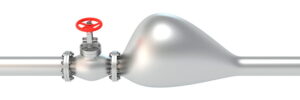
If you’ve been a homeowner in a cold climate for at least a few winters, you probably already know about the dangers of burst pipes. When the temperatures drop below freezing, the threat level for burst pipes begins to rise.
We’re familiar with this phenomenon since we’ve handled plumbing in Tallmadge, OH since 1963. We’ve seen our fair share of burst pipes, and so we can tell you about why this happens, as well as what you can do about it and how to avoid it.
When pipe freeze causes pipe burst
A burst pipe in winter is most likely to occur when water freezes inside a pipe—although not exactly for the reason people think. When water freezes, it takes up more volume. This is something you’ll have noticed if you ever put a glass of water in the freezer. When the water in the glass freezes, it can cause the glass the break because of the expansion. So when water freezes in a pipe, the water expansion would seem to push out against the pipe and cause it to crack apart.
What actually happens is an increase in air pressure inside the pipe that causes the pipe to burst laterally. The frozen water creates a blockage that raises the air pressure. This is why plumbers strongly advise homeowners not to attempt to unthaw frozen pipes themselves since melting the ice will further raise the pressure—and this is when the burst occurs.
Still, the ice expansion is a problem and if it occurs at a weak joint it can cause the pipe to break apart.
Fixing frozen pipes
When you discover frozen pipes, the best step to take is to call professional plumbers. They can thaw out the pipe without raising the danger of creating a burst pipe. While you’re waiting for the plumbers to arrive, relieve the pressure on the pipe by opening up the tap connected to it and let the remaining water out. Then keep the tap open to allow for all the air pressure to leave. The plumbers will be able to safely thaw the pipe. In some cases, they may recommend replacing older frozen pipes.
Stopping pipe bursts by stopping pipe freeze
The key to stopping your pipes from freezing is to keep them warm or insulated enough. Exposed pipes in the house are at the highest danger of freezing. You can put insulating sleeves on them to protect them. These sleeves are sold at most home improvement stores. You can also arrange with our plumbers to create effective insulation for your pipes.
During the winter, never allow your house to grow colder than 55°F. This won’t be an issue when you’re home, but it’s important to remember when you go on vacation: set the thermostat for when you’re gone for 55°F so the house will get just warm enough to prevent pipe freeze. (This will also save you money heating up the house when you return from vacation.)
At the start of winter, detach all hoses from hose bibs and drain them of water. Frozen water in hoses can move straight into the bibs and the pipes.
Crown Group Ohio—Your Comfort Experts since 1962! Call us for plumbing service 24 hours a day, 7 days a week.


